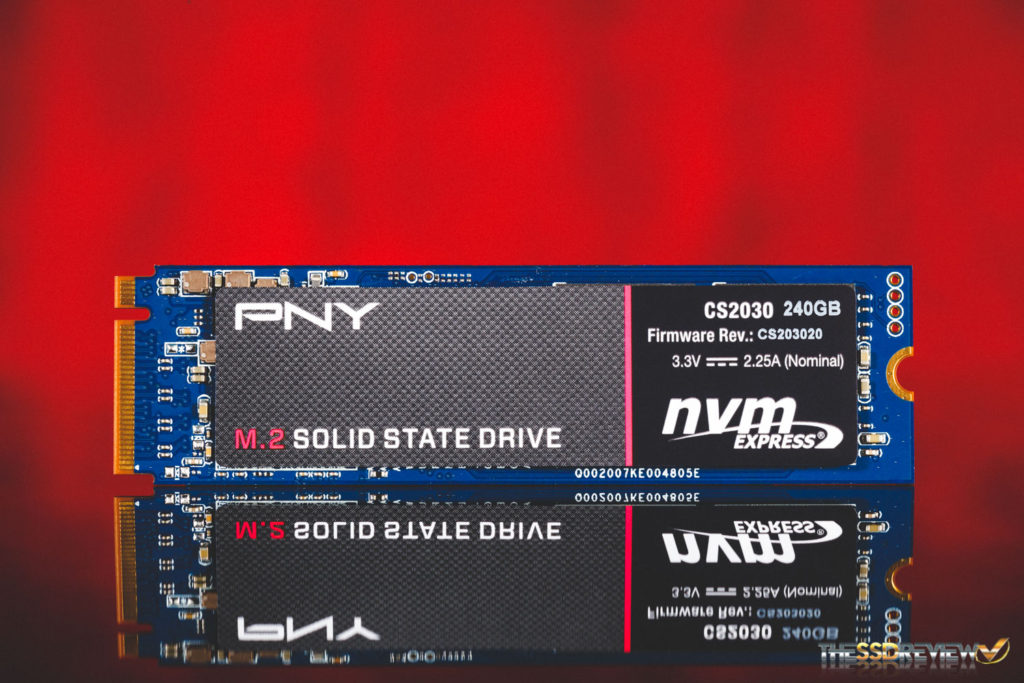REPORT ANALYSIS AND FINAL THOUGHTS
In today’s testing, just how well did Phison’s E7 controller do? More importantly, how good is PNY’s first NVMe SSD? We gotta say one word: Solid. Yes, we know solid is also a marketing term Crucial is using, but it suits the PNY CS2030 perfectly. It isn’t a benchmark king, but it performs very well. In ATTO it reached 3GB/s read and nearly 2.3GB/s write, but based on what we have seen with testing other Phison controllers in the past, we are going to disregard that result. Instead, we are going to taking AS SSD’s, CDM’s, and Anvil’s results, as well as our more real world based results, to be more accurate and representative of its true performance.
In Crystal Disk Mark the PNY CS2030 reached nearly 2.8GB/s read, but fell short of the 1.5GB/s write specification and instead just hit 1.376MB/s. AS SSD and Anvil both show lower write scores as well. 4K QD1 performance showed to be very impressive in AS SSD. It reached over 15K IOPS for read, which even beats out the Samsung 960 Pro! It also achieved 309K IOPS read and 270K IOPS write in Crystal Disk Mark, which is right in line with the specifications.
Moving on to PCMark 8 we see the PNY’s results are again, solid. It beats out the Samsung 960 EVO and Intel 750 in the standard test suite, but lags behind slightly in the extended test. If you are looking for a heavy workload monster, this lower capacity SSD may not be the best choice for you, but if you are using it for light-medium workloads, then this SSD will suit you just fine.
Finally, during our 30GB write test and power consumption tracking, the CS2030, yet again, proved to be quite a solid product. Write performance was similar to the Samsung 950 Pro, but power consumption was a bit better when looking at MB/s Watt. Also, its idle power consumption result was the lowest on the chart yet.
FINAL THOUGHTS
The PNY CS2030 is a solid mainstream SSD choice. It is available in two capacities (240GB & 480GB), competitively priced (well…was more so before black Friday and Cyber Monday sales), and comes with a standard 3-year warranty. With read performance of nearly 3GB and write speeds of up to 1.5GB/s, the Phison E7 powered CS2030 is a high-performance NVMe SSD that holds its own against some of the fastest products out there. It even beats out the Samsung 960 EVO at the similar capacity in PCMark 8’s test suite, which emphasizes its great real world use case performance.
Though it doesn’t have the sexy black PCB other competitors may have, it still looks quite appealing with the carbon-like sticker design on the PCB and is much cheaper to boot. If you are in the market for a new mainstream NVMe SSD, you can confidently add this drive to your comparison list. We award the PNY CS2030 our Silver Seal.
 The SSD Review The Worlds Dedicated SSD Education and Review Resource |
The SSD Review The Worlds Dedicated SSD Education and Review Resource | 


4K QD1 read IOPS tells me most likely not Micron flash.
Probably WD/Toshiba slight chance even Hynix.
Googling the NAND print reveals other SSD reviews that identify this as a Toshiba 64GB 15nm MLC package.
As long, as it is double sided, it’s no deal for many slim ultrabooks.
Can you give us a specific of that?
I wonder how it would behave with some cooling. Maybe problem with heavy loads lies in overheating ? Maybe this ‘m2 shield’ stuff could help. If so then with minimal added cost its perfect.